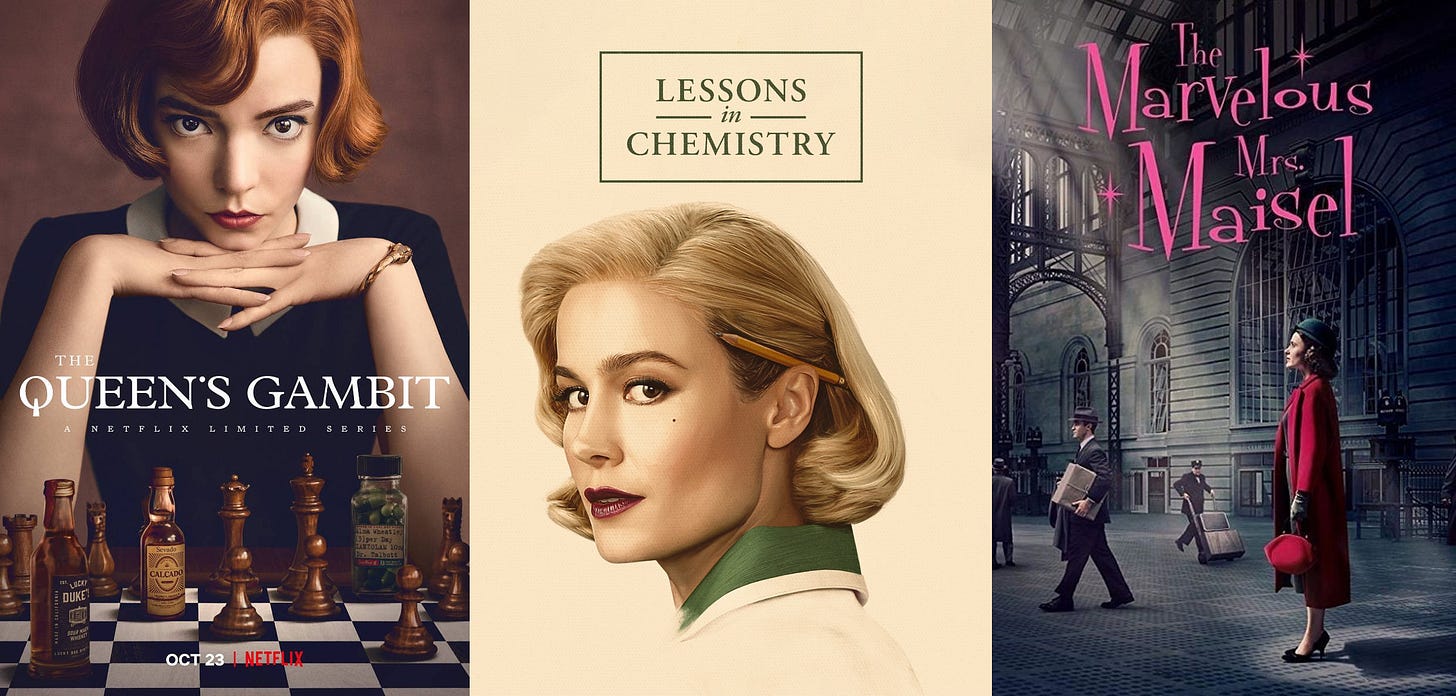[#10] Nevertheless, She Persisted: Lessons in Chemistry by Bonnie Garmus
By Devki Pande
There is an emerging genre in books and films - women proving and asserting themselves in male-dominated arenas in the 50s and 60s in America. The Queens Gambit is one of them. The Marvellous Mrs. Maisel is the other. There is also Physical, by Rose Bryne. And Lessons in Chemistry by Bonnie Garmus – soon to air on Apple TV on the 13th of October, follows in the footsteps of this genre.
It is 1961. Elizabeth Zott is a brilliant chemist at the Hastings Research Institute in Commons, California. Underpaid, overworked, and treated like a secretary. Nevertheless, she persists. She is determined to research abiogenesis – the idea that life arose from non-life. In the process, quite by accident, she collides headlong with Calvin Evans, a Nobel Prize-nominated scientist in the research institute. With him, she has instant, if you’ll excuse the pun – chemistry. Calvin is the first man to take her work seriously. He encourages her, is an ally to her, and a rower himself, gets her to start rowing – one of the most physically intensive sports there is.
In the beginning, Elizabeth sucks at it. Her problem? Physics. Well, for a scientist, that is easily remedied.
The dialogue strips everything away – and with unerring clarity, posits that being female in 60s America meant being laid siege to. Elizabeth Zott is a brilliant scientist. Yet, nothing counts greater than her sex. The final straw is when her research on abiogenesis is passed off as her Director’s. Elizabeth quits – widowed and pregnant. Later, to provide for her daughter, she goes back to Hastings Research Institute. Instead, she is informed by the Director, that he expects her to assist lab tech and take a course in dictation. And then, Elizabeth and Miss Frask, a secretary at the Institute who has always hated her, experience a moment of solidarity when they realise they both got thrown out of doctoral programmes after being sexually assaulted by their mentors.
But Lessons in Chemistry highlights that ability will always create opportunities, regardless of sex. By coincidence, Elizabeth is offered to host a cooking show called Supper in Six, where between 1:30 – 4:30, she must teach housewives how to cook full meals. Elizabeth has always been a brilliant cook because cooking is chemistry, and she treats it as such. A serious, scientific subject. But a group of channel heads – all men, she is informed what women want. So she is encouraged to do herself up in beehive hairstyles, hourglass skin-fitting clothes. But Elizabeth refuses it all. Suddenly, housewives all over America feel themselves taken seriously for the first time.
The show is a hit for the channel – one of the most massive hits, which none of the channel heads can understand. The line for the live audience starts at 4am in the morning. Women quote Elizabeth’s formulas to each other on the streets. A quiet revolution is taking place on the streets of Commons, California – and beyond, in Boston, Chicago, and New York. Interviews pour in.
The book is structured like a sports biography – obstacle after obstacle, until finally, reward. It's funny and warm, and also real and sad. Because Elizabeth Zott has had a tough life. Losses that have crippled human being. And to be single, unwed, and female in the 60s in any country was to live a life of perpetual inconsequence. But there’s Six Thirty, an abandoned German Shepherd who was once trained to sniff out bombs. There’s her neighbour, Harriet Sloane, her neighbour, who helps her with childcare. There's her executive producer, Walter Pine.
I won't give it away. But you know how they say you have to read through all the average and mediocre stuff to get to to the book that's worth it? This is the book. This is worth it.
And casting Brie Larson as Elizabeth Zott? Brilliant move
.



